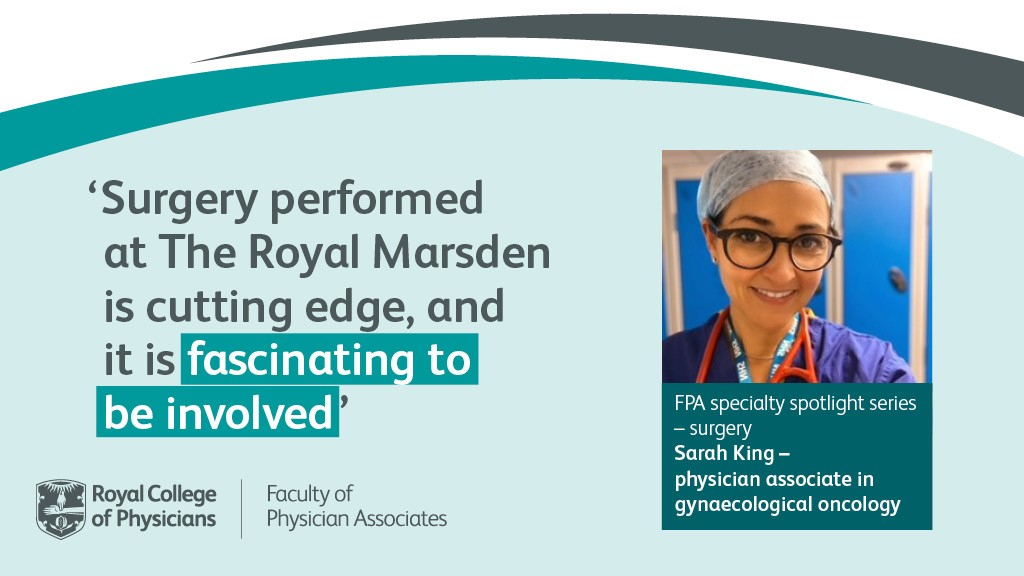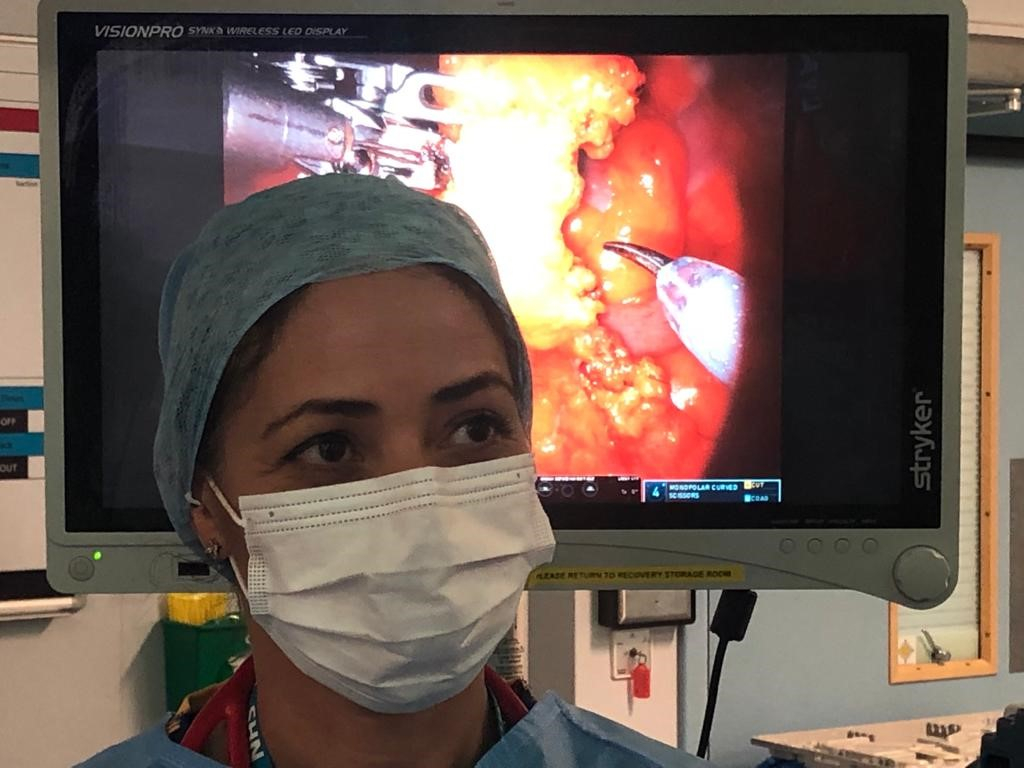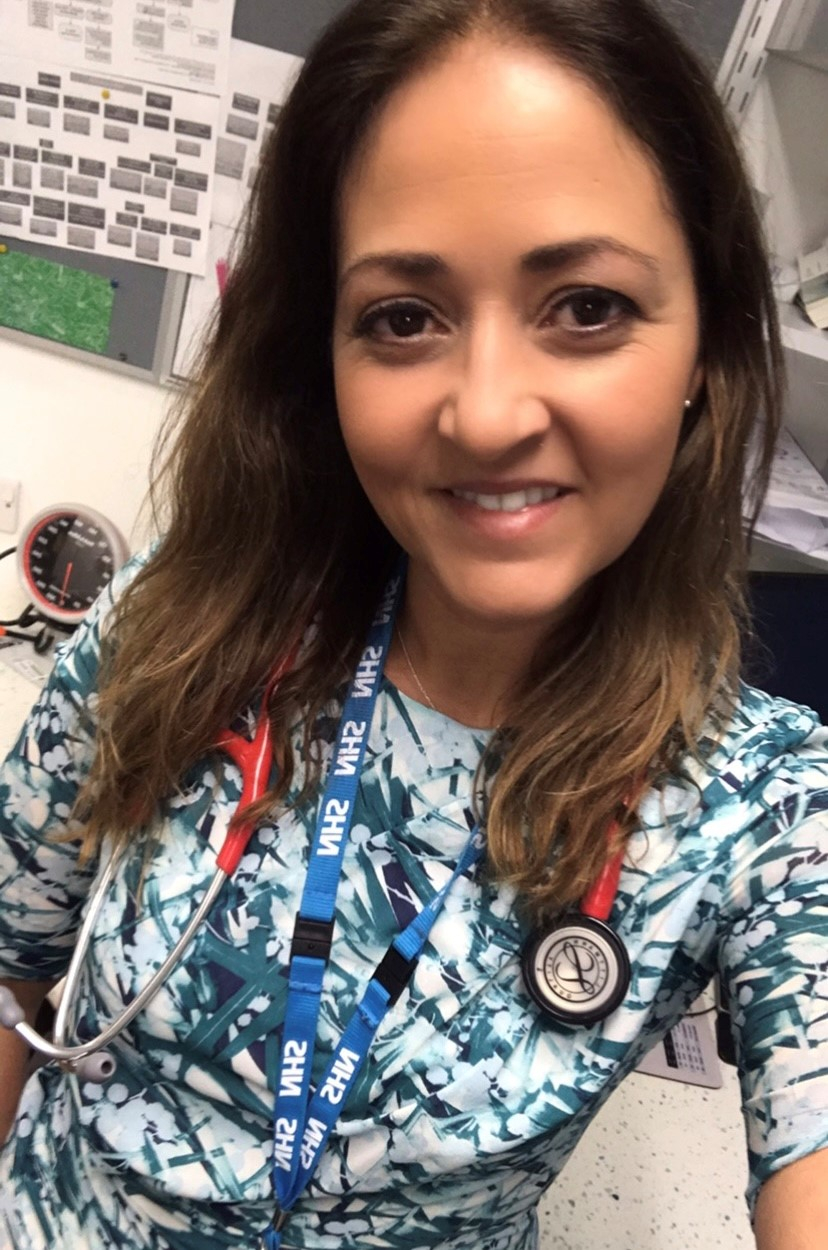Spotlight series: physician associates in surgery – gynaecological oncology
The key requirement for acceptance on a physician associate (PA) course is an undergraduate degree in a health or science subject. However, PAs come from a wide range of backgrounds and experiences.
Sarah King worked in investment banking for 15 years before deciding she wanted a different role, which she felt would provide more job satisfaction. Currently a PA working in gynaecological oncology surgery at The Royal Marsden NHS Foundation Trust, Sarah shares her story.
What made you decide to become a PA?
I had a place to study medicine after my A-levels. After taking a gap year, I decided to do an undergraduate degree in biomedical science instead, and I really enjoyed it. From here, I embarked on a career in the city. Starting as an accountant, I then became a management consultant and finally worked as a senior director in investment banking, where I led global strategic change projects. I worked in the city for 15 years and I’m proud that I had an interesting career. However, I increasingly found myself considering a career change, and my passion for medicine never left me. I have three children and, during maternity leave, I would find myself thinking about going back to university and retraining as a clinician.
I came across PAs at my GP surgery and A&E when one of my children was ill. The PAs were amazing, and so thorough when taking my child’s history and examining them. I was impressed and intrigued that they were like doctors and provided exceptional patient care. I talked to them further about the PA role and shadowed them to gain further understanding of the role. I really liked what I saw and how it was another route to a medical profession, and went on to study my PA course at Queen Mary University of London. I qualified in 2020.
 Can you tell us more about your experience of working as a PA in gynaecological oncology surgery?
Can you tell us more about your experience of working as a PA in gynaecological oncology surgery?
I have always had an interest in women’s health, and during my PA course the placement I enjoyed most was in obstetrics and gynaecology. My first PA role was in general practice, where I was the lead PA in HRT and contraception – this is when my interest in women’s health continued to grow. I also knew from my course placements that I had an interest in surgery, which is why I decided to apply when a relevant role at The Royal Marsden was advertised.
I enjoy thinking holistically about the patient and their journey. We are a tertiary centre, so the patients I meet either have a diagnosis of cancer or there is a high degree of clinical suspicion that they might have cancer. I can support them on their entire journey, from the clinic appointment where we clerk them, examine and consent them for their surgery, to assisting in that surgery, and then caring for them on the ward. Once they are discharged, I also follow them up in outpatient clinics, so in this way, I get to be involved in the entire cycle of care that the surgical team provides.
There is great scope for me to learn in my role, which I thrive on. The consultants see the value in PAs and support my working across the gynaecology clinics, wards and surgery. This has really enabled me to continue growing my medical and clinical knowledge, as I’m not limited to one area.
What diagnostic/investigation/procedural skills have you gained?
Surgery performed at The Royal Marsden is cutting edge, and it is fascinating to be involved. The surgeons are well renowned in their field and complicated patients are often referred here. We perform open, laparoscopic and robotic surgeries, and I have had the opportunity to assist in them all.
Being present with such skilled surgeons is a fantastic experience. I’m lucky that my consultants and clinical fellows are keen to further involve me, and I have recently attended a surgical skills course at the Royal College of Surgeons of England. My first aim is to become a competent surgical assistant, for example holding the camera for laparoscopic surgeries and performing open and closed laparotomy cases. I eventually will then become more skilled and competent to better support my team and advance my career.
Working between the clinics and wards has made me more aware of the adjuvant chemotherapy treatment that our patients often have to also undertake – although chemotherapy is managed by a different team, it’s part of our patients’ journey. I attend the weekly multidisciplinary team (MDT) meeting, which is improving my understanding of how the different gynaecological cancers are staged and allows me to be present when management plans for complex patients are discussed. There will also be additional opportunities for me to train and extend my surgical skill set.
 How would you describe the impact your role as a PA has had in gynaecological oncology surgery?
How would you describe the impact your role as a PA has had in gynaecological oncology surgery?
For patients, a diagnosis of cancer can be one of the most scary, if not the scariest, diagnosis of their and their families’ lives. They are entering the unknown, and as a PA, I’m able to be there as a consistent point of contact and support as we are permanent members of staff. A case I remember well concerned a patient who had an anaphylactic reaction on the induction of anaesthesia. The surgery was being performed to remove a large ovarian mass. I was able to be part of this patient’s journey from the point of recovery in the critical care unit, and then when she was on the ward afterwards. I arranged her allergy testing, her lung function tests, ordered repeat scans and blood tests that were all input into the MDT. She was rebooked to have her surgery, which took place recently and she is doing very well. I will be present in her next outpatient clinic visit and, in this way, although a junior member of the team, I remain a consistent voice and support during her journey.
Despite only being in my role at The Royal Marsden for less than 3 months, I am happy to have already received positive feedback verbally from patients on the ward. I recently got a card and some biscuits from a patient in the clinic, which really showed me the positive impact I have already had.
What do you find the most enjoyable and rewarding being a PA?
I decided to work in medicine because I wanted the opportunity to work in an environment to constantly learn. Medicine is continually evolving, and this really excites me. This, coupled with working alongside intelligent, passionate colleagues, offers the opportunity to work in a rewarding environment where I get to learn something new every single day. I am still at the beginning of my PA journey and new to working in gynaecological oncology surgery, but I already know it will be the start of an exciting career.
The relationship I create with my patients and their families makes my role so rewarding. Here at The Royal Marsden, we’re supporting cancer patients through one of the biggest mental, emotional and physical challenges of their lives. Being a part of the team that can support them and make their cancer journey smoother, and to be part of the surgical team that can perform life-extending or, in some cases, curative surgeries is the greatest privilege.
As a PA working in gynaecological oncology surgery, what challenges do you face?
A common theme for all PAs who work at The Royal Marsden is role identity. I was one of five PAs hired across five surgical teams at the Chelsea site. I am lucky that my consultants are great advocates for the role and have pioneered hiring PAs, but the challenge of people understanding the scope of the PA role, and what we can and can’t do, remains.
The focus for numerous people is the lack of prescribing, and although I admit this is a frustration, it’s worth reiterating that PAs have so many clinical skills and competencies beyond prescribing – it’s a shame that people focus on what we can’t do yet.
 What does the future look like for you as a PA?
What does the future look like for you as a PA?
I want to remain in women’s health. I really love the practical aspect of surgery, and my goal is to develop my skills further. I would like to build up a portfolio of experience and learn more about gynaecological cancers and surgical techniques, including laparoscopic and robotic techniques. I hope to get involved with setting up a vulval outpatient clinic to provide a new service to patients, and I would also like to get involved in supporting some exciting new research being done by the team.
What advice would you give to a PA looking to practise in gynaecological oncology surgery?
Have an open mind, as the PA profession approaches each specialty differently. This is the beauty of what we do, as we can continue to learn and grow our knowledge. Don’t be afraid of what may come next, and welcome new opportunities with confidence. I found that making positive connections on placements helped when I was looking for new roles.
I recommend keeping people’s numbers and email contacts and getting in touch – you will stand out from other applicants and I found this helped me. If you are still a student, my advice is to be professional and proactive on placements. Show that you are keen by asking to go into theatre and observe. Ask questions, research the specialty and, most of all, be enthusiastic and passionate.
We’re always looking for qualified PA members and PA student members of the FPA to share their story. If you’re interested in sharing yours, get in touch using the contact details below. If you’re thinking of a career as a PA, you can learn more about how to begin your journey here.
Get in touch to share your PA story:
Jenna Donaldson – FPA communications officer
